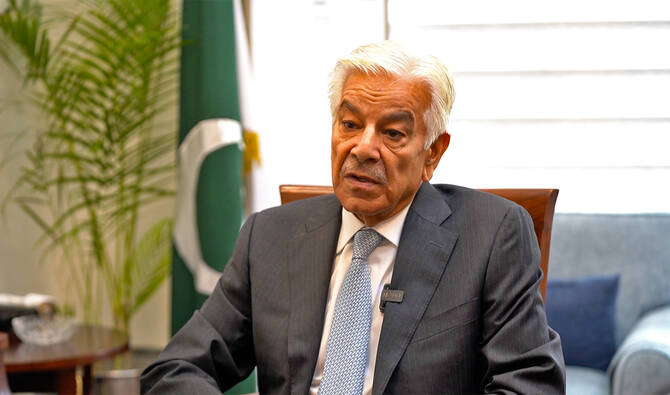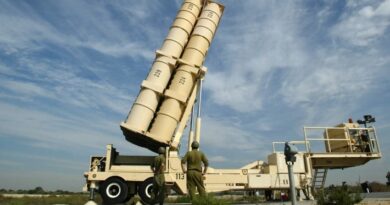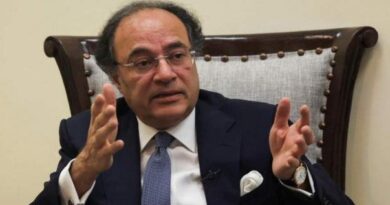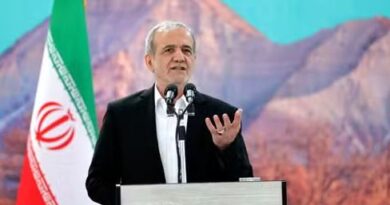No new military cooperation with Iran, direct talks with US amid conflict: Kh Asif
Mobilizing China, Muslim nations to press for calm before
ISLAMABAD: Defense Minister Khawaja Asif has said Islamabad had
not engaged in any new military cooperation with Tehran since
Israel launched attacks on Iran and had not held specific talks with
the United States over the escalating crisis in the Middle East.
In an exclusive interview with Arab News, Khawaja Asif said regular
security cooperation was continuing with Iran along their shared
border to combat militant groups, but no fresh operational
coordination had been initiated in response to Israel’s attacks on
Iranian territory since June 13.
“I don’t see any need of [it],” the defense minister said in response to
a question on whether Pakistan’s military was coordinating with
Iranian counterparts on the border or engaging in any fresh defense
cooperation.
“We coordinate on a very regular basis as far as the Iran and
Pakistan border is concerned because of terrorist activities… that
sort of cooperation is already on. So I don’t see any new activity.”
Asked if Pakistan had held talks with Washington to discuss the fast-
evolving situation, the defense minister said there had been no
recent contact specifically on the crisis in the past five days:
“But we are in constant touch with the United States of America
regarding the tense situation we have in this region.”
Khawaja Asif said Pakistan’s leadership was instead focused on
engagement with close partners like China and Muslim countries to
press for calm, warning that the conflict risked engulfing the entire
region.
“The countries who have religious affinity with us or geographical
affinity, even China or other countries, because what we are
pursuing is peace,” he said.
“And we would like to mobilize the countries of this region that this
conflict can multiply and it can engulf the whole region into a
situation which could be very, very disastrous.”
The Defense Minister described Israel as a state with “hegemonic
intent” whose recent actions in Gaza and against Iran were
“extremely dangerous to the immediate region,” and said global
public opinion was turning against Israeli policies despite support
or muted reactions from many Western governments.
Kh Asif declined to comment on reports that Pakistan had scrambled
fighter jets near its nuclear sites and the Iranian border in response
to Israel’s initial strikes on Iran but insisted that its nuclear security
remained robust.
In addition to the Middle East tensions, Pakistan faced a major
military standoff with India last month in which the two nations
exchanged missile, drone and artillery attacks. Islamabad claimed to
have shot down six Indian jets and struck back at military positions,
triggering fears of a wider conflict between the nuclear-armed rivals
before a ceasefire was announced by the President Donald Trump
administration on May 10.
When questioned about any direct threat to Pakistan’s national
security or strategic assets as a result of the conflict in the Middle
East, the defense minister said Pakistan’s armed forces were already
on high alert following the latest confrontation with New Delhi,
describing the country’s nuclear facilities as “very militantly
guarded, very grudgingly guarded” and fully compliant with
international safeguards.
“Since our short war with India [in May], we have been on alert so
we have not lowered guards… We can never take the risk of any
attack on our nuclear facility from anywhere, that is something
which is a lifeline as far as our defense is concerned,” he said
Asif said Pakistan’s performance in the recent fight with India was
evidence of the country’s defense capability and national resolve,
which would deter Israel from any adventurism.
“We have just had a bout with India and we clearly established our
superiority, the superiority of our armed forces, Air Force, Pakistan
Army, Pakistan Navy and the determination of our people, the way
the nation stood behind the armed forces,” the defense minister
said. “So I think Netanyahu or his people or his government will think
many times before taking on Pakistan.”–NNI



